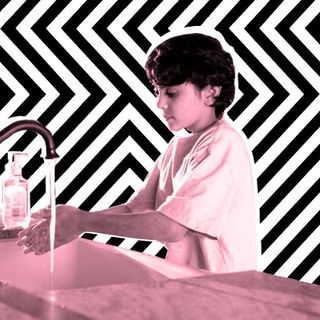
Delhi Gov Says Schools’ Mental Health Curriculum Will ‘End Terrorism, Pollution’
Government officials continue to wildly misunderstand mental wellness.

In yet another spectacular misunderstanding of mental health, the Deputy Chief Minister of Delhi, Manish Sisodia, today launched a new wellness program in Delhi schools that “will end terrorism, pollution, and produce a generation of children who will not engage in all this.”
It’s unclear whether the “happiness curriculum” will also end world hunger and increase unicorn spotting.
Hyperbolic claims aside (Sisodia also claims the curriculum will soon be followed by schools across the country “and the entire world”), the new curriculum, which was developed by 40 government-school teachers, officials from the State Council of Educational Research and Training, Delhi, and NGO partners, is certainly a step toward more holistic education, which is worth praising.
“All government schools will have 45 minutes of class where they will be taught meditation along with meaning of three kinds of happiness — momentary, deeper and sustainable. The aim is to develop them into adults who are happier and stress-free,” reports The Indian Express.
The light foundation of emotional intelligence and self-reflection this will lay is encouraging, and not un-important, especially since it includes a tool (meditation) students can use to engage in these exercises long after the lessons stop.
But the focus on happiness is confusing — you cannot make people be happy and stress-free just by explaining what happiness is. In fact, you cannot make people be happy and stress-free, period.
If schools were to focus on any emotion or ability (since happiness appears to be couched as both here) the concept of resilience seems a more obvious choice for the stated long-term aim. Resilient people — people who are able to bounce back after failure; who are able to build healthy, supportive relationships; and who are able to self-reflect on all emotions, not just happiness — are less likely to be ruled by the stress and negative emotions this intervention purports to eliminate. While it’s possible the “happiness curriculum” could contribute to resilience in tandem with other efforts, a “resilience curriculum” would be so much more effective.
But that would mean challenging the cult of achievement ingrained in the Indian school system and helping children embrace failure — a move as unlikely as a school curriculum that can cure pollution and terrorism.
Delhi isn’t the only school system concerned about its students’ mental well-being. A far more encouraging intervention in Gurgaon, also launched today, is seeking to identify and support learning disabilities early in students, a move that will do much to preempt mental unwellness.
“The result of an unaddressed learning disability is often emotional, psychological or behavioural difficulties for the child,” wrote Dr. Zirak Marker for The Swaddle last year. “Kids with learning disabilities deal with increased stress and anxiety, and low self-esteem and confidence. They may even have poor life skills. In part because of this, more than one-third of students with learning disabilities drop out of school before grade 12.”
Through “Project Zindagi,” teachers at five schools in Gurgaon, three in Sohna, four in Pataudi, and three in Farrukhnagar will receive training in identifying learning disabilities. These students “will also be made to participate in yoga sessions, mental healthcare activities and anger management classes,” Gunjan Gahlot, the Haryana chief minister’s good governance associate for Gurgaon, tells The Indian Express.
At the same time, “students will be counselled and attempts will be made to reduce their stress,” says Vinay Pratap Singh, deputy commissioner of Haryana. “In addition, if there are any physical or mental obstructions or deficiencies in their learning environment, this project will attempt to identify and tackle those accordingly.”
We hope that students with learning difficulties won’t be as singled out in practice as these officials’ words suggest; learning disabilities still carry stigma, and it would be a shame if an otherwise well-planned intervention played into that. Support in the various forms they mention should be on offer, but perhaps not all should be mandatory, but individualized in consultation with the child, their parents and teachers. Singh says if the current pilot goes well, Project Zindagi will be expanded to the district’s public schools. It’s an effort likely to have longer lasting effects on happiness than a happiness curriculum.
Liesl Goecker is The Swaddle's managing editor.
Related


Researchers Develop World’s First ‘Artificial Ovary’
